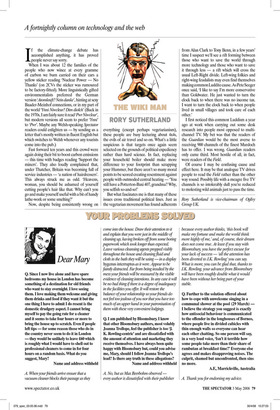I f the climate-change debate has accomplished anything, it has proved
people never say sorry. When I was about 12 the families of the people who now wince at every gramme of carbon we burn carried on their cars a yellow sticker reading ‘Nuclear Power — No Thanks’ (on 2CVs the sticker was rumoured to be factory-fitted). More linguistically gifted environmentalists preferred the German version ‘Atomkraft? Nein danke’, hinting at sexy Baader-Meinhof connections, or in my part of the world ‘Ynni Niwclear? Dim diolch’ (Back in the 1970s, I am fairly sure it read ‘Pwr Niwclear’, but modern versions all seem to prefer ‘Ynni’ to ‘Pwr’. Maybe any Welsh-speaking Spectator readers could enlighten us — by sending us a letter that’s mostly written in fluent English but which switches to Welsh whenever any tourists come into the pub.) Fast forward ten years and this crowd were again doing their bit to boost carbon emissions — this time with badges reading ‘Support the miners’. They also loudly complained that, under Thatcher, Britain was becoming full of service industries — ‘a nation of hairdressers’. This always struck me as odd. ‘Heavens, woman, you should be ashamed of yourself cutting people’s hair like that. Why can’t you go and make yourself useful with a bit of handy lathe-work or some smelting?’ Now, despite being consistently wrong on everything (except perhaps vegetarianism), these people are busy lecturing about 4x4s, the evils of air travel and so on. What’s a little suspicious is that targets once again seem selected on the grounds of political expediency rather than hard science. In fact, replacing your household boiler should make more difference to your footprint than scrapping your Hummer, but there aren’t so many moral points to be scored creating resentment against people with outmoded central heating — ‘You still have a Potterton-Baxi 407, grandma? Why, you selfish so-and-so!’ But what fascinates me is that many of these issues cross traditional political lines. Just as the vegetarian movement has found adherents from Alan Clark to Tony Benn, in a few years’ time I suspect we’ll see a rift forming between those who want to save the world through more technology and those who want to save it through less — a rift which will cross the usual Left-Right divide. Left-wing folkies and right-wing feudalists may even find themselves making common Luddite cause. As Pete Seeger once said, ‘I like to say I’m more conservative than Goldwater. He just wanted to turn the clock back to when there was no income tax. I want to turn the clock back to when people lived in small villages and took care of each other.’ I first noticed this common Luddism a year ago at work when carrying out some desk research into people most opposed to multichannel TV. My bet was that the readers of the Guardian would be the most averse to receiving 900 channels of the finest Murdoch has to offer. I was wrong. Guardian readers only came third. Most hostile of all, in fact, were readers of the Field.
Of course I may be confusing cause and effect here. It may be that analogue TV drives people to read the Field rather than the other way round. Possibly life with a meagre five TV channels is so intolerably dull you’re reduced to molesting wild animals just to pass the time.
Rory Sutherland is vice-chairman of Ogilvy Group UK.


















































































 Previous page
Previous page